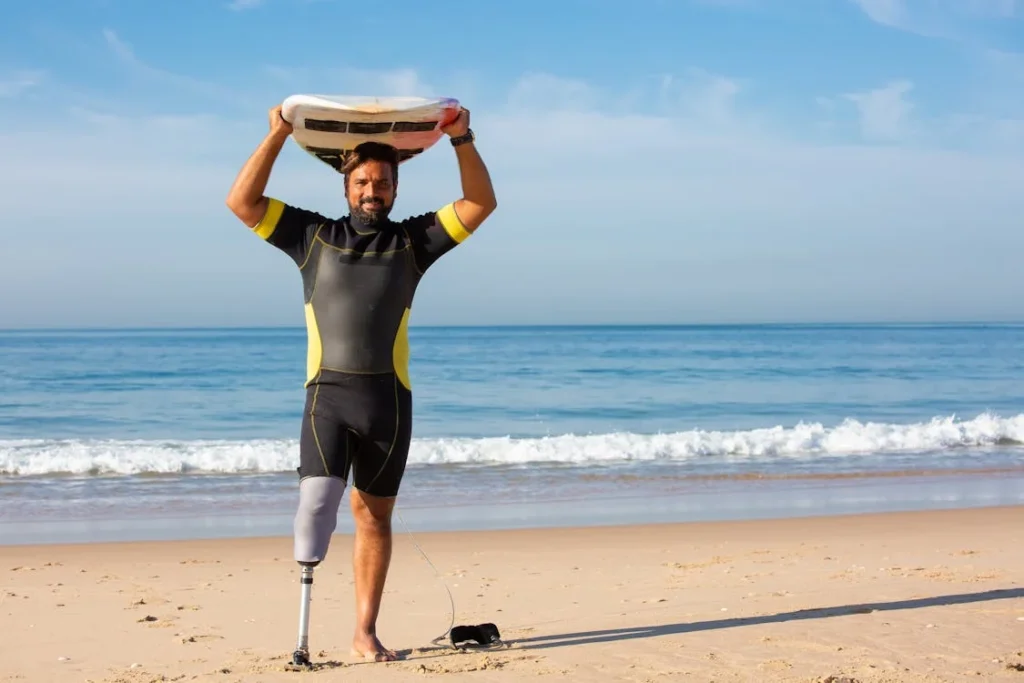Losing a limb is a life-changing experience. It can bring a mix of emotions—fear, frustration, sadness, and uncertainty. But while the physical journey of recovery is important, the mental journey is just as crucial. Your mindset can shape how you adapt, rebuild confidence, and reclaim independence.
A positive mindset doesn’t mean ignoring challenges. It means facing them with strength, hope, and the right mental strategies. With the right approach, you can turn obstacles into stepping stones, allowing yourself to grow stronger, both mentally and emotionally.

Understanding Your Emotions and Accepting Change
The journey of adjusting to life after an amputation starts with understanding your emotions. It is normal to feel a range of emotions—grief, anger, sadness, and even moments of hope.
These feelings are part of the healing process. The key is to allow yourself to feel them without judgment. Ignoring emotions can make the journey harder, but acknowledging them gives you the power to work through them.
Giving Yourself Time to Heal
Healing is not just about the body; it is also about the mind. Some days will be harder than others, and that is okay. It is important to give yourself the time and space to adjust to this new chapter in your life.
There is no set timeline for emotional healing. Some people find acceptance quickly, while others take longer. What matters most is that you move at your own pace and not compare your journey to anyone else’s.
Allow yourself to grieve the loss, but also recognize that life is not over. The more you give yourself permission to feel, the easier it becomes to process those emotions.
Talking to a trusted friend, family member, or therapist can help you express your thoughts and make sense of the changes you are experiencing.
Replacing Negative Thoughts with Positive Ones
It is natural for the mind to focus on what has been lost. Negative thoughts may creep in, telling you that you are incomplete or that life will never be the same.
While it is true that things have changed, it does not mean life has lost its meaning. When negative thoughts arise, challenge them with positive ones.
Instead of thinking, “I will never be able to do things like before,” try shifting your focus to, “I will find new ways to do the things I love.”
Your mind is powerful, and the way you talk to yourself shapes your reality. Each time a negative thought comes up, replace it with a thought that empowers you. Over time, this practice will help you develop a mindset that focuses on possibilities rather than limitations.
Finding Strength in Small Wins
Progress may feel slow at times, but every small step matters. Celebrate the little victories, whether it is learning to use a prosthetic, walking a few extra steps, or even just getting through a tough day.
Recognizing these achievements builds confidence and reminds you that you are capable of overcoming challenges.
Each step forward, no matter how small, is proof that you are growing and adapting. Instead of focusing on what you cannot do yet, focus on what you have already accomplished. This shift in perspective will help you see progress even on the toughest days.
Building a Support System
You do not have to go through this journey alone. Surrounding yourself with people who uplift and encourage you can make a huge difference.
Family, friends, support groups, and even professionals can offer emotional support and guidance. Connecting with others who have been through similar experiences can also provide comfort and inspiration.
If you feel isolated, consider joining a support group or reaching out to organizations that help amputees. Hearing other people’s stories and sharing your own can remind you that you are not alone.
Having a strong support system helps you stay motivated and gives you the strength to keep moving forward.
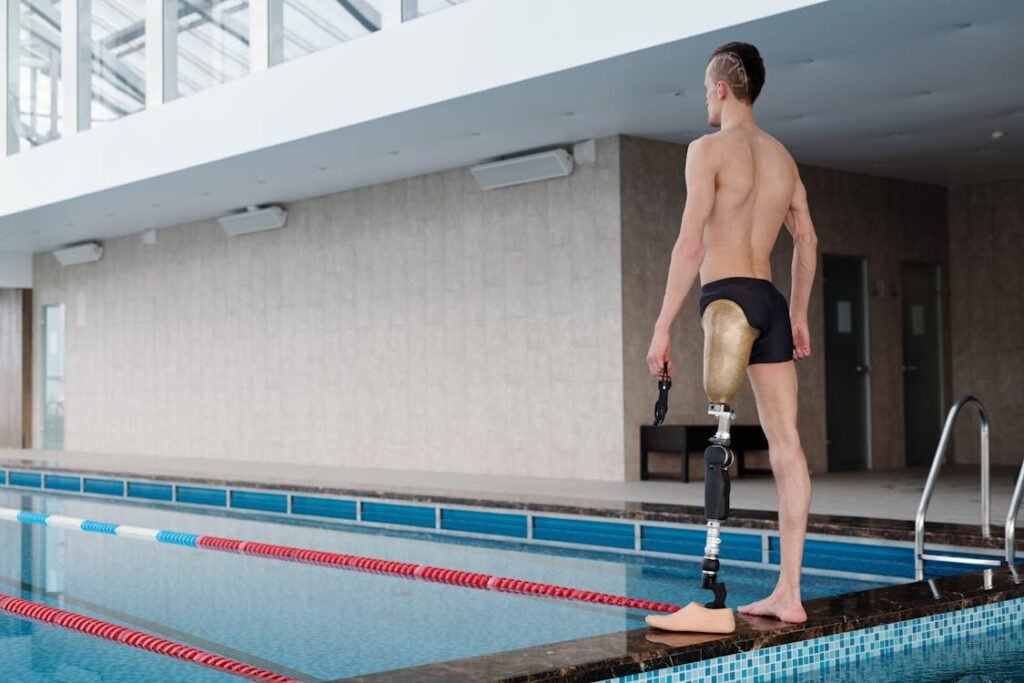
Developing Resilience and a Growth Mindset
Adjusting to life after an amputation requires resilience—the ability to adapt, recover, and keep moving forward despite challenges. Resilience is not something you are born with; it is something you build over time.
The way you handle setbacks, approach new experiences, and embrace challenges determines how smoothly you transition into this new phase of life. A strong mindset will help you overcome obstacles and rediscover a sense of control.
Learning to Adapt to Change
Change can be uncomfortable, but it also presents new opportunities for growth. Instead of seeing amputation as the end of what you once knew, try viewing it as the beginning of something different.
The way you once did things may not be possible anymore, but that does not mean you cannot find new ways to live a full and meaningful life.
A major part of adapting is learning to let go of frustration. Feeling frustrated when simple tasks take more effort is understandable, but frustration does not have to define your experience.
Every time you try something new—whether it is learning to use a prosthetic or figuring out a new daily routine—you are giving yourself a chance to improve. The more you practice patience with yourself, the easier adaptation becomes.
Setting Realistic Goals and Taking Small Steps
One of the best ways to stay motivated is by setting small, achievable goals. The key is to focus on what you can do rather than what you cannot. Start with simple, everyday tasks and gradually challenge yourself with bigger goals.
If you are learning to use a prosthetic, set a goal to wear it for a short period each day. If mobility is a challenge, focus on improving little by little.
These small victories will add up, and before you know it, you will see how much progress you have made. Goals give you direction and a sense of purpose.
They remind you that even though the journey may be difficult, each step forward brings you closer to regaining independence.
Embracing a Growth Mindset
A growth mindset is the belief that your abilities can improve with time and effort. People with a growth mindset do not see failure as a dead end but as an opportunity to learn and grow. Instead of saying, “I cannot do this,” try thinking, “I cannot do this yet, but I will learn.”
This shift in perspective can be powerful. It turns obstacles into learning experiences and helps you stay motivated, even when things do not go as planned.
Every challenge you face is an opportunity to discover new strengths. The more you practice a growth mindset, the more resilient you will become.
Finding New Ways to Stay Independent
Losing a limb does not mean losing independence. Many assistive technologies, including advanced prosthetics like Grippy™, can help restore function and confidence.
Learning to use a prosthetic may take time, but with patience and practice, it becomes second nature. Home-based rehabilitation programs, such as gamified exercises, can also make the process more engaging and effective.
Independence also comes from problem-solving and creativity. Finding new ways to do things—whether it is adjusting how you cook, drive, or exercise—can open doors to a fulfilling life. With determination and the right support, you can regain control and confidence in your abilities.
Staying Mentally Strong Through Setbacks
There will be days when progress feels slow, and setbacks may feel discouraging. These moments are part of the journey. What matters most is how you respond to them.
Instead of focusing on what went wrong, try to see what can be learned from the experience. Every setback is temporary, and each challenge you overcome makes you stronger.
Practicing self-compassion during difficult times is just as important as pushing forward. Remind yourself that it is okay to struggle, and do not hesitate to seek support when you need it.
A strong mindset is not about being positive all the time; it is about staying hopeful even when things are tough.
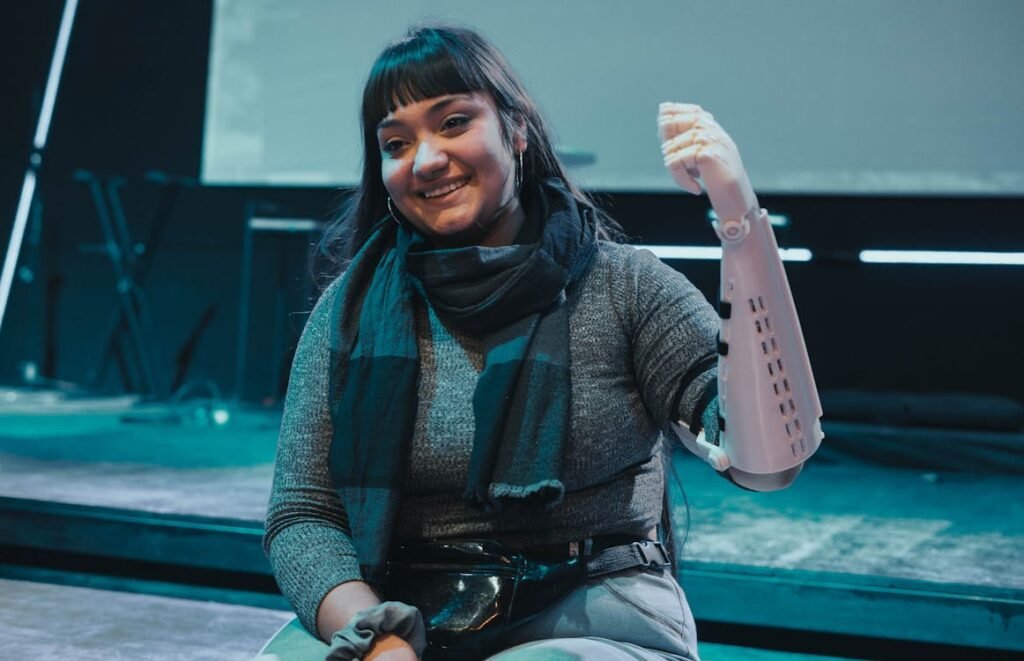
Rebuilding Confidence and Self-Identity
Losing a limb can affect how you see yourself. Your body has changed, and with that change may come doubts about your identity, self-worth, and how others perceive you. These feelings are completely natural.
However, confidence is not about looking a certain way—it is about how you feel about yourself. The way you think about your abilities, your strengths, and your future plays a major role in how you regain self-assurance.
Rebuilding confidence takes time, but with the right mindset, it is absolutely possible.
Accepting Your New Reality
One of the first steps toward confidence is acceptance. This does not mean ignoring the difficulties or pretending that everything is fine.
Instead, it means recognizing that your body has changed, but you are still the same person inside. Acceptance allows you to move forward with an open mind rather than staying stuck in the past.
At first, looking in the mirror might feel unfamiliar. You may notice changes in how clothes fit, how you move, or how others react to you. These adjustments take time.
The more you focus on what you can do rather than what you have lost, the easier it becomes to embrace your new reality.
Try to remind yourself that confidence is not about having a perfect body. It is about how you carry yourself, how you speak to yourself, and how you push through challenges. Confidence grows when you start believing in your abilities again.
Challenging Negative Self-Talk
The way you talk to yourself shapes how you feel. If your inner voice constantly tells you that you are weak, incapable, or different in a bad way, it will be hard to build confidence. But you have the power to change this.
Each time a negative thought arises, challenge it. If you think, “I will never feel normal again,” replace it with, “I am adjusting, and every day I am getting stronger.” If you tell yourself, “People will judge me,” shift that thought to, “I am more than my appearance, and I deserve to be treated with respect.”
The more you practice positive self-talk, the more your mindset will shift. Confidence starts in the mind, and when you believe in yourself, others will see that strength in you as well.
Stepping Outside Your Comfort Zone
One of the most powerful ways to rebuild confidence is to push yourself to try new things. It is easy to withdraw from activities or social situations because of fear or discomfort.
But confidence does not grow in isolation. The more you step outside your comfort zone, the more you will realize what you are capable of.
Start with small challenges. If you feel nervous about going out in public, begin with short outings. If you are hesitant to try a new activity, take it one step at a time. Each time you push yourself beyond your fears, you prove to yourself that you are stronger than your doubts.
Over time, these small steps add up. You will begin to feel more comfortable in your own skin and more willing to take on new challenges. Confidence is built through action, not just thought.
Embracing Prosthetics as Part of Your Strength
For many amputees, using a prosthetic can feel like both a physical and emotional adjustment. At first, it may seem like a reminder of what was lost. But in reality, a prosthetic is not a sign of weakness—it is a tool that empowers you to live independently.
Advanced prosthetics, like Grippy™, are designed to restore function and give you a sense of normalcy. The more you practice using your prosthetic, the more natural it will feel. Instead of seeing it as something separate from you, try thinking of it as an extension of your abilities.
Gamified rehabilitation can make this process even smoother, helping you build muscle memory and confidence in a fun, engaging way. The more comfortable you become with your prosthetic, the more you will see it as a source of strength rather than limitation.
Finding Activities That Make You Feel Strong
Confidence grows when you engage in activities that remind you of your capabilities. Whether it is exercise, art, music, or a new hobby, finding something you enjoy can boost your sense of self-worth. Physical activity, in particular, can be a great way to build both physical and mental strength.
Adaptive sports and fitness programs for amputees can help you regain a sense of control over your body. Activities like swimming, cycling, and even running with prosthetic limbs have helped many amputees rebuild their confidence.
The goal is not just physical improvement but also a mental shift—proving to yourself that you are still capable of great things.
Surrounding Yourself with Encouragement
The people around you can have a big impact on how you see yourself. Supportive family members, friends, and communities can help lift you up and remind you of your strengths. If you ever feel discouraged, turn to those who believe in you.
Connecting with other amputees can also be incredibly empowering. Hearing stories from people who have walked a similar path can inspire you and show you what is possible. Support groups and online communities can be great places to find encouragement and motivation.
Confidence Is a Journey
Rebuilding confidence does not happen overnight. It is a process of small steps, mindset shifts, and new experiences. Some days will feel easier than others, and that is okay. What matters is that you keep moving forward.
Confidence is not about proving anything to the world—it is about proving to yourself that you are strong, capable, and worthy of living life to the fullest. No matter how difficult the journey, you have the power to reclaim your self-worth and face the future with courage.
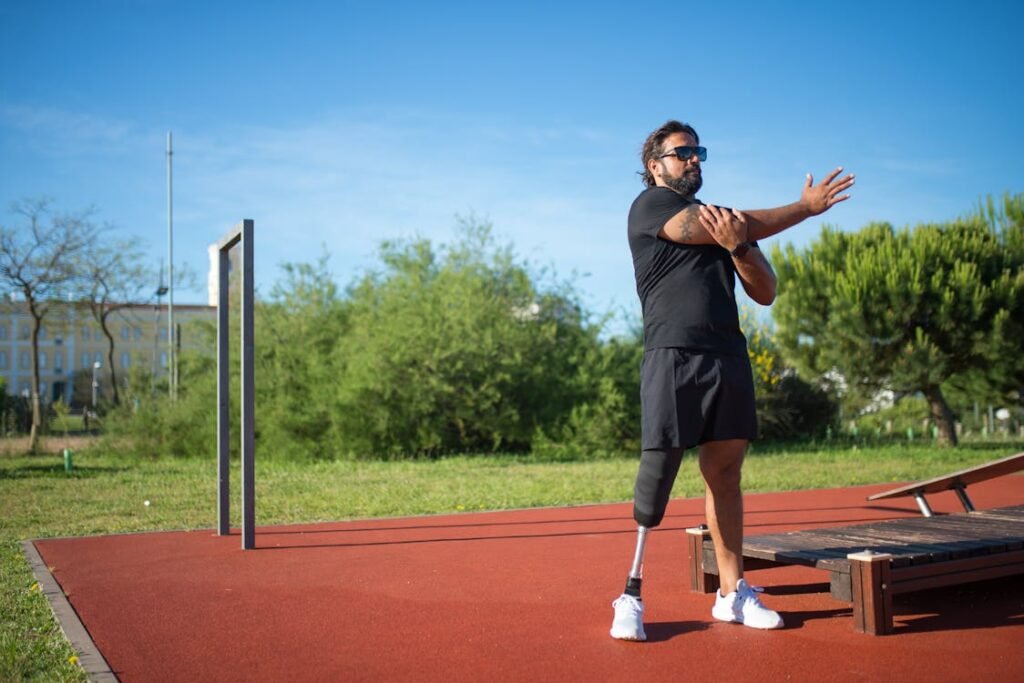
Finding Purpose and Moving Forward
After an amputation, life may feel uncertain. You might wonder what the future holds or question whether you will ever feel the same sense of purpose you once had.
These thoughts are completely natural, but purpose is not something that disappears—it is something that evolves. The key is to shift your focus from what was lost to what can still be gained.
With the right mindset, you can rediscover meaning, set new goals, and create a fulfilling life.
Redefining What Purpose Means to You
Purpose does not have to mean the same thing it did before your amputation. Perhaps your old goals revolved around a career, physical activities, or personal aspirations that now seem difficult.
Instead of seeing this as an end, view it as a chance to redefine what brings you joy and fulfillment.
Think about what excites you, what makes you feel accomplished, and what kind of impact you want to have in the world. Purpose is not just about what you do—it is about how you live.
It can be found in small moments, like helping others, learning new skills, or simply taking pride in your progress.
Many amputees discover a new sense of purpose by sharing their experiences, mentoring others, or becoming advocates for disability awareness.
Others find fulfillment in hobbies, creative outlets, or personal growth. The possibilities are endless, and your purpose is uniquely yours to define.
Setting New Goals for the Future
Having goals gives life direction. They do not have to be grand or complicated; even small goals can provide motivation and a sense of progress.
Start by thinking about what you want to achieve—whether it is physical recovery, returning to work, learning a new skill, or simply gaining more independence.
Break down your goals into manageable steps. If you are adjusting to a prosthetic, set a goal to practice wearing it for a few hours each day.
If you want to regain mobility, focus on gradual progress rather than immediate results. Every small step brings you closer to where you want to be.
It is okay if your goals shift over time. Life is always changing, and flexibility is important. The most important thing is to keep moving forward, even when progress feels slow. Each effort you make, no matter how small, is a step toward a brighter future.
Turning Challenges into Opportunities
Difficult experiences often bring new opportunities. While losing a limb is undeniably challenging, it can also lead to unexpected growth.
Many amputees develop greater resilience, patience, and appreciation for life. Some even find that their experience opens doors they never considered before.
Rather than seeing obstacles as barriers, try viewing them as opportunities to learn and adapt. Struggles can teach you valuable lessons about strength, problem-solving, and perseverance.
Each challenge you face and overcome adds to your experience and makes you more capable of handling future difficulties.
Some of the world’s most inspiring athletes, artists, and professionals have overcome physical challenges. Their success was not because their path was easy but because they refused to give up.
Your journey can be just as powerful if you choose to embrace each challenge with determination.
Building a Life That Brings You Joy
Happiness is not about circumstances—it is about mindset. The most important thing you can do for yourself is to create a life that brings you joy.
Focus on the things that make you feel good, whether it is spending time with loved ones, engaging in activities you enjoy, or simply appreciating the small moments in everyday life.
Surround yourself with positivity. Seek out people who uplift and support you. Engage in activities that make you feel strong, capable, and inspired. The more you fill your life with things that bring you happiness, the easier it becomes to see the beauty in your journey.
Helping Others and Giving Back
One of the most powerful ways to find purpose is by helping others. Many amputees find great fulfillment in sharing their experiences, offering support, or mentoring those who are going through similar challenges.
Your journey can inspire others and show them that life after amputation is not just about survival—it is about thriving.
Whether it is through volunteering, joining support groups, or simply being open about your story, giving back can provide a deep sense of meaning. It reminds you that your experience has value and that you have the power to make a difference in someone else’s life.
Moving Forward with Confidence
Life after amputation is not about going back to the way things were—it is about creating a new and fulfilling path. The road may not always be easy, but with the right mindset, resilience, and support, you can build a life filled with strength, confidence, and purpose.
You are not defined by what you have lost. You are defined by your ability to keep going, to adapt, and to find joy in the journey. No matter what challenges come your way, you have the power to move forward with hope and determination.
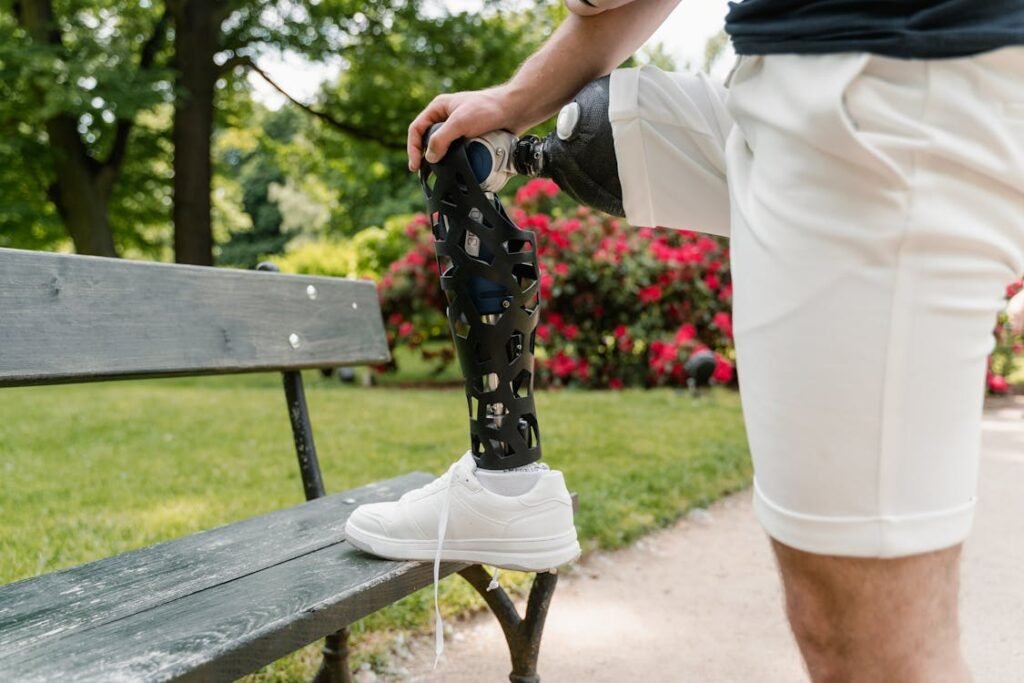
Strengthening Mental Health and Emotional Well-Being
Your mind plays a crucial role in your recovery and overall well-being. Mental health is just as important as physical health, and taking care of your emotional state will help you navigate life after amputation with greater ease.
The journey may come with ups and downs, but building emotional resilience will allow you to handle stress, fear, and self-doubt in a healthier way.
Recognizing and Managing Emotional Triggers
There may be moments when certain situations, thoughts, or memories bring feelings of sadness, frustration, or anxiety. These emotional triggers can make recovery feel overwhelming, but learning to recognize and manage them can prevent them from taking control.
Triggers can be anything from seeing an old photo, hearing a comment from someone, or struggling with a task that used to be easy. When these feelings arise, acknowledge them instead of pushing them away.
Remind yourself that emotions are temporary, and just because something feels difficult now does not mean it will always feel this way.
Developing coping strategies—such as deep breathing, journaling, or talking to someone—can help you process emotions in a healthy way. Over time, the more you practice managing these triggers, the stronger and more in control you will feel.
Practicing Self-Compassion
It is easy to be hard on yourself when adjusting to a new way of life. You may feel frustrated if progress is slow or if you struggle with things that used to be simple. But treating yourself with kindness and patience is essential for your mental well-being.
Think about how you would support a friend going through a similar situation. You would encourage them, remind them of their strengths, and reassure them that they are doing their best.
Offer yourself that same level of understanding. You are learning, adapting, and growing every day. Mistakes and setbacks do not mean failure; they are simply part of the process.
Self-compassion also means allowing yourself to rest when needed. Healing—both physically and mentally—takes energy. Giving yourself time to recover, rather than forcing progress, will ultimately help you move forward more effectively.
Finding Peace Through Mindfulness and Meditation
Mindfulness is the practice of being present in the moment, without judgment. It can help you manage stress, reduce anxiety, and improve emotional well-being.
By focusing on the present instead of worrying about the past or future, you can train your mind to stay calm and balanced.
Simple mindfulness techniques, such as deep breathing or guided meditation, can be powerful tools in handling difficult emotions.
Even just taking a few minutes each day to focus on your breath, observe your thoughts without attachment, or practice gratitude can create a sense of inner peace.
Meditation does not require any special equipment or experience. Many free apps and online resources offer guided sessions to help you get started.
Over time, mindfulness can help you feel more in control of your thoughts and emotions, allowing you to approach challenges with greater clarity and confidence.
Seeking Professional Support When Needed
There is no shame in asking for help. Adjusting to life after an amputation can be mentally exhausting, and speaking with a mental health professional can provide valuable guidance.
Therapy can help you process emotions, develop coping strategies, and work through any lingering fears or anxieties.
Counseling can be particularly helpful if you experience depression, post-traumatic stress, or ongoing emotional distress. A therapist can help you reframe negative thoughts, build confidence, and navigate the emotional complexities of your journey.
If in-person therapy is not an option, online counseling services can provide support from the comfort of your home. Many support groups also offer peer counseling, allowing you to connect with others who understand what you are going through.
Strength Comes from Within
Your mental and emotional well-being directly impact your ability to adapt, grow, and move forward. Prioritizing self-care, seeking support, and practicing mindfulness will help you build inner strength and resilience.
No matter how difficult the journey, you have the power to nurture your mental health and create a fulfilling, balanced life.
Conclusion
Life after an amputation is not about returning to who you were before—it is about discovering who you are now. It is about finding new ways to live with confidence, embracing challenges as opportunities, and proving to yourself that you are stronger than your circumstances. While the journey may not always be easy, it is one filled with potential, growth, and purpose.
A positive mindset does not mean ignoring hardships; it means facing them with resilience and determination. The way you talk to yourself, the support you surround yourself with, and the goals you set all shape how you move forward. Each small victory, each moment of self-belief, and each new skill learned adds to your strength.
If you are ready to take the next step in your journey, whether through rehabilitation, prosthetic solutions, or support systems, Robobionics is here to help. Our innovative prosthetic solutions, including Grippy™, the advanced bionic hand, are designed to restore function and confidence. Book a free demo today and experience how the right technology can empower you.
You are not alone in this journey. With the right mindset, support, and tools, you can reclaim your independence and build a life that inspires not just yourself, but those around you. Your future is bright—step forward with confidence.



